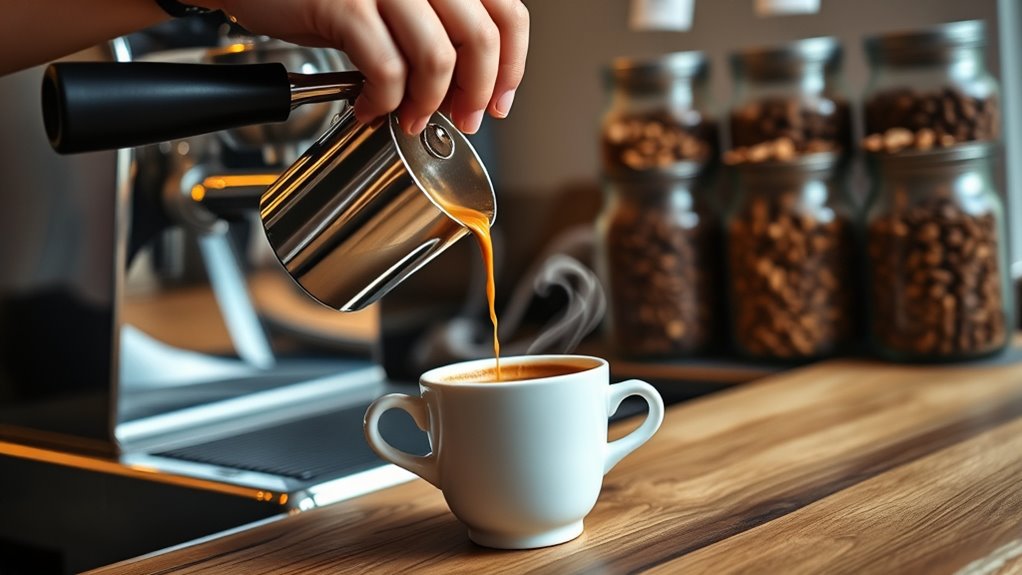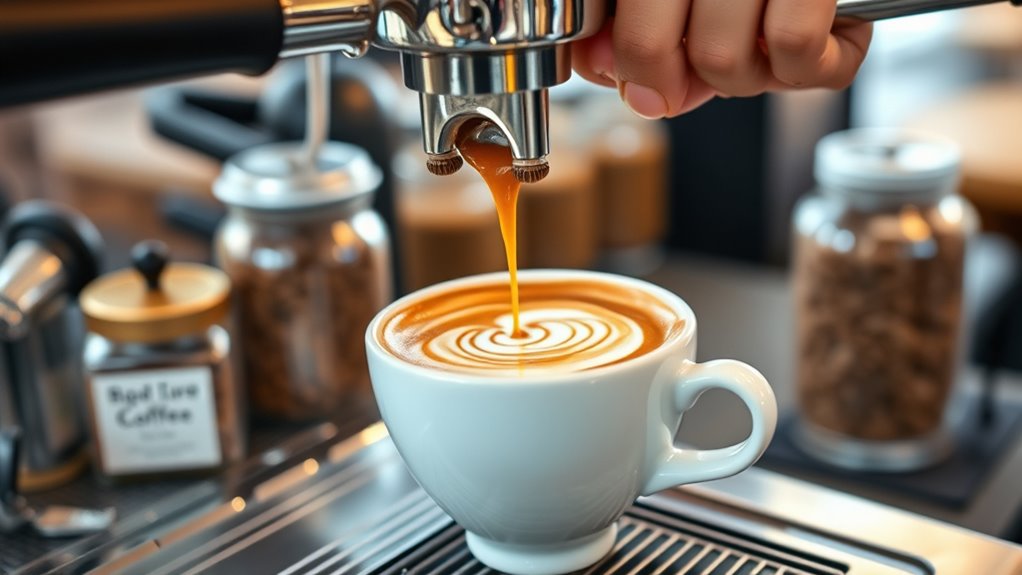The rise of specialty coffee means you get higher-quality brews with richer flavors, often sourced ethically and sustainably. You’ll notice more transparency about where your coffee comes from and the stories behind it, aligning with your values. Innovative brewing techniques and unique flavors are now easier to explore, especially if you prefer artisanal options. This movement supports local communities and promotes environmentally friendly practices, making your coffee experience more meaningful. Discover how this shift can elevate your daily ritual.
Key Takeaways
- Consumers are increasingly seeking high-quality, ethically sourced coffee with transparency in supply chains.
- Younger consumers prioritize artisanal brewing, unique flavors, and sustainable practices when choosing specialty coffee.
- Industry innovations like advanced brewing tech and ready-to-drink options enhance consumer experiences.
- Specialty coffee supports local communities and farmers, promoting socioeconomic and environmental benefits.
- Growing market size signals more choices for consumers and a shift towards value-driven coffee consumption.

Have you noticed how specialty coffee is taking over your favorite cafes and supermarket shelves? It’s more than just a trend; it’s a movement driven by your evolving tastes and values. The global specialty coffee market was valued at USD 101.6 billion in 2024, and it’s projected to grow at a steady rate of 10.4% annually through 2030. In the U.S. alone, the market hit nearly USD 48 billion in 2024, with a growth rate of 9.5%.
This rapid expansion reflects how more consumers, especially younger ones, are prioritizing quality, sustainability, and ethical sourcing in their coffee choices. Nearly half of American adults drank specialty coffee in the past day, and lots of young adults—like those aged 18 to 24—consume it daily. Millennials, in particular, show a strong preference for artisanal brewing methods and unique flavor profiles, valuing quality over quantity.
Younger consumers prioritize quality, sustainability, and ethical sourcing in their daily specialty coffee choices.
Your preferences are shaping this shift. Consumers now care deeply about where their coffee comes from and how it’s produced. Certifications like Fair Trade and Rainforest Alliance aren’t just buzzwords—they’re essential indicators of ethical sourcing that influence your purchasing decisions. Transparency in supply chains and sustainability initiatives are increasingly important, and you’re more likely to support brands that prioritize eco-friendly practices.
This means packaging, sourcing, and production methods are all evolving to meet your expectations for environmental stewardship. As a result, brands that emphasize sustainability often enjoy greater loyalty and trust. Additionally, advances in brewing technology are allowing for more precise extraction of flavors, enhancing your coffee experience.
The market’s growth also opens up exciting opportunities for you. Cafes are expanding their offerings, introducing innovative ready-to-drink options like cold brew, and experimenting with unique flavors and brewing techniques. Third-wave coffee shops are educating consumers about the nuances of coffee, helping you appreciate the craft behind each cup.
These innovations not only improve quality but also create new ways for you to enjoy your favorite beverage. As competition increases and raw material costs rise, industry players are investing more in sustainable production and technological advancements to maintain quality and efficiency. This dedication to innovation benefits you by providing consistently excellent coffee that aligns with your values.
Economically, the rise of specialty coffee benefits local communities, supporting farmers through premium prices and generating jobs. The growing demand encourages investment in production infrastructure and sustainable farming practices, which can lead to better livelihoods and environmental outcomes.
Globally, the specialty coffee market is expected to reach USD 76.88 billion by 2033, growing even faster than before, further emphasizing how deeply it’s intertwined with your daily life. Ultimately, your appreciation for high-quality, ethically sourced coffee is fueling this growth, shaping a future where your favorite brew isn’t just about taste but also about making a positive impact.
Frequently Asked Questions
How Does Specialty Coffee Impact Local Coffee Farmers?
Specialty coffee impacts local farmers positively by offering higher prices, which boost their income and enable investments in their farms.
You support sustainable practices that protect the environment and guarantee more stable yields.
Direct trade and better market access help farmers get fair pay and diversify their customers.
When you choose specialty coffee, you help farmers improve their livelihoods, adopt eco-friendly methods, and build stronger connections with global markets.
What Certifications Should Consumers Look for in Specialty Coffee?
When choosing specialty coffee, look for certifications like Fair Trade, Rainforest Alliance, Organic, and SCA.
Fair Trade ensures fair wages for farmers, Rainforest Alliance promotes eco-friendly farming, Organic guarantees no synthetic chemicals, and SCA focuses on quality standards.
These certifications help you enjoy high-quality, sustainably produced coffee, while supporting ethical practices and environmental health.
Always check the label to make informed choices that benefit both farmers and the planet.
How Does Specialty Coffee Influence Global Coffee Prices?
Imagine the coffee market as a delicate garden where specialty beans are rare blooms. When supply dwindles due to climate or labor issues, prices climb like a treetop reaching for the sky.
Your choices, driven by quality and transparency, push prices higher globally. As demand from emerging markets and home brewers grows, this vibrant garden influences coffee costs everywhere, shaping the world’s coffee prices in a dance of scarcity and value.
Are There Specific Brewing Methods Unique to Specialty Coffee?
You’ll find that specialty coffee features unique brewing methods like pour-over, French Press, Chemex, AeroPress, and siphon. These techniques give you precise control over variables like temperature, grind size, and bloom time, enhancing flavor extraction.
What Are the Environmental Benefits of Choosing Specialty Coffee?
Choosing specialty coffee is like planting seeds for a greener future. You help conserve water and protect natural habitats through sustainable farming practices.
Your choice supports biodiversity, reduces soil erosion, and limits harmful chemicals. By opting for eco-friendly methods like shade-grown coffee and local sourcing, you actively lower deforestation and your carbon footprint.
Your decision not only energizes your mornings but also nurtures the environment and communities for generations to come.
Conclusion
As you sip your next cup, remember you’re tasting more than just coffee—you’re experiencing a world of passion and craftsmanship. The rise of specialty coffee transforms each brew into a vibrant story, a journey from bean to cup. So, embrace this flavorful revolution, and let every sip inspire curiosity and appreciation. With every cup, you’re part of a movement that celebrates artistry, dedication, and the rich tapestry behind every perfect brew. Cheers to your coffee adventure!









